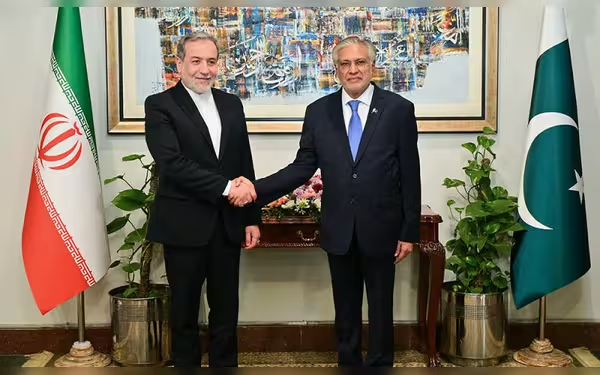Thursday, November 7, 2024 05:52 AM
Iran Asserts Right to Legitimate Defense After Israeli Strikes
- Iran claims right to legitimate defense against Israeli aggression.
- Pakistan condemns Israeli actions as military aggression and law violations.
- Tensions escalate following recent military exchanges between Iran and Israel.
 Image Credits: brecorder
Image Credits: brecorderIran's FM asserts right to defense after Israeli strikes, while Pakistan condemns the aggression, highlighting escalating tensions in the region.
In recent developments, Iran's Foreign Minister Abbas Araghchi has asserted that the country possesses the right to "legitimate defense" following Israeli airstrikes on its military sites. This statement was made during a press conference in Pakistan, where Araghchi emphasized that Iran is not looking for "escalation" but is prepared to respond to what it describes as Israeli aggression. The backdrop of this situation involves a series of military actions between Iran and Israel, with tensions escalating significantly in recent months.
On October 26, Israeli warplanes conducted strikes targeting Iran's defense capabilities and missile production facilities. Israel claimed these actions were necessary to counter threats posed by Iran. However, Iranian officials have maintained that their missile production remains unaffected by the attacks. This military exchange is part of a broader conflict, with the recent Israeli strikes being a response to an earlier Iranian missile barrage on October 1, which was itself retaliation for the killing of Iranian leaders and a commander of the Revolutionary Guards.
During the press conference, Araghchi stated, "Unlike Israel, the Islamic Republic of Iran doesn’t seek escalation; however, we reserve our inherent right to legitimate defense." He further assured that Iran would respond to the Israeli strikes "in a proper time and in a proper manner," emphasizing a calculated approach to any potential retaliation. This careful wording suggests that while Iran is prepared to defend itself, it is also mindful of the broader implications of military conflict.
In a show of solidarity, Pakistan's Foreign Minister Ishaq Dar joined Araghchi in condemning Israel's actions, labeling them as "unrestrained military aggression" and a "grave violation" of international law. Dar pointed out that Israel's actions against civilians and its illegal measures in occupied territories are unacceptable and contravene established international norms. This condemnation reflects Pakistan's longstanding position on the Israeli-Palestinian conflict, as the country has no formal diplomatic relations with Israel.
The situation remains tense, with Iran's Supreme Leader Ayatollah Ali Khamenei also indicating that the Islamic Republic would retaliate against Israeli actions. This ongoing conflict raises significant concerns about regional stability and the potential for further military escalation.
As the world watches these developments unfold, it is crucial to understand the complexities of international relations in the Middle East. The cycle of retaliation between Iran and Israel not only affects the two nations but also has broader implications for global peace and security. The need for diplomatic dialogue and conflict resolution has never been more pressing, as the consequences of military actions can reverberate far beyond the immediate region.













